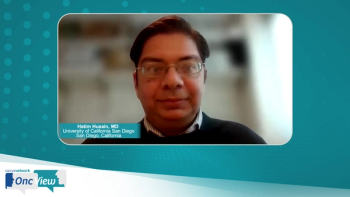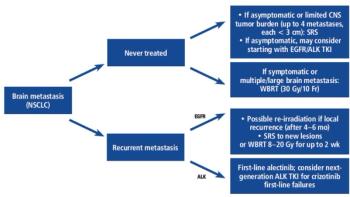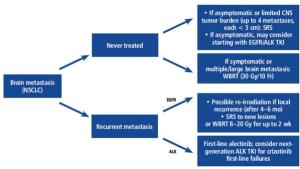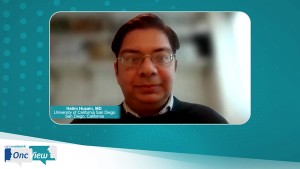
Concludes that early EGFR-MET co-targeting can redefine first-line EGFR-mutant NSCLC management and improve survival outcomes.

Your AI-Trained Oncology Knowledge Connection!


Concludes that early EGFR-MET co-targeting can redefine first-line EGFR-mutant NSCLC management and improve survival outcomes.

Reveals that resistance complexity and heterogeneity were notably lower with dual-targeted treatment.

Demonstrates that longer amivantamab exposure further reduces the emergence of MET and EGFR mutations.

Details updated molecular analyses showing significantly fewer resistance mutations with combination therapy.

Presents MARIPOSA trial results showing superior progression-free survival and overall survival with amivantamab plus lazertinib.

Illustrates how osimertinib resistance emerges through diverse EGFR and MET alterations, leading to disease relapse.

Reviews the decade-long progress in EGFR-targeted therapies and introduces the rationale for first-line dual inhibition.

Dr. Husain discusses how anticipating resistance mechanisms and tailoring post-progression strategies based on initial therapy are key to optimizing sequencing in EGFR-mutant NSCLC.

Dr. Husain discusses how selecting between FLAURA-2, MARIPOSA, and other frontline regimens requires balancing efficacy, safety, and sequencing considerations to deliver the most personalized care in EGFR-mutant NSCLC.

Dr. Husain discusses how updated MARIPOSA and FLAURA-2 data highlight the growing role of combination regimens in improving both systemic and CNS outcomes for patients with EGFR-mutant NSCLC.

An expert discusses how comprehensive genomic profiling will continue growing as an essential component of personalized cancer care, expanding into serial testing for resistance monitoring, tumor burden tracking, and potentially earlier-stage cancers as targeted therapies prove effective beyond advanced disease.

An expert discusses how education about the clinical impact of genomic testing, understanding of targeted therapies, turnaround times, and team-based approaches are essential to bridge the gap in routine comprehensive genomic profiling adoption.

An expert discusses how comprehensive genomic profiling panels that include relevant targets, resistance markers, and clonal hematopoiesis information have proven most useful, along with technologies that can detect fusion events, point mutations, and copy number variations for serial monitoring over time.

An expert discusses how molecular profiling has become essential for most solid tumor cancers, particularly in lung cancer, where both tissue- and plasma-based testing using next-generation sequencing help identify actionable genomic targets and monitor resistance patterns.

An expert discusses how molecular profiling has become essential for most solid tumor cancers, particularly in lung cancer, where both tissue- and plasma-based testing using next-generation sequencing helps identify actionable genomic targets and monitor resistance patterns.

Personalized therapy for non–small cell lung cancer has evolved significantly with the advent of comprehensive molecular testing.

Closing insights into managing EGFR-mutant NSCLC, from evolving treatment options and sequencing strategies to addressing unmet needs and the importance of comprehensive genomic testing.

Unmet needs in EGFR exon 20 insertion lung cancer, emphasizing the importance of early identification, selectivity against wild type EGFR, CNS activity, and mechanisms of resistance.

Experts discuss the rapidly evolving treatment landscape for EGFR exon 20 insertion lung cancer, highlighting recent advancements in therapies, clinical trial results, and the quest for first-line treatment options, providing valuable insights into managing this unique patient population.

Learn about the latest developments in the treatment of lung cancer, focusing on EGFR mutations, antibody-drug conjugates (ADCs), targeted therapies, and biomarker-driven approaches to improve patient outcomes in various stages of the disease.

Shared insight into the complexities in treating EGFR mutant lung cancer during the second-line therapy phase, including safety profiles of different treatment regimens, managing toxicities, and ongoing research to improve patient outcomes.

Experts consider the influence of combination therapies on EGFR-mutant lung cancer treatment, including the impact on central nervous system (CNS) response, challenges in CNS metastases management, and the potential alternatives to whole-brain radiation.

Explore significant updates in the field of EGFR-mutant lung cancer treatment, focusing on the introduction of combination therapy in the first-line setting, including the FLAURA2., MARIPOSA, and RAMOSE trials, offering improved progression-free survival and potential implications for patient care.

Insights into diagnosing EGFR-mutant lung cancer and explores evolving first-line treatment strategies, incorporating recent developments, combinations, and clinical trial data, while addressing challenges in testing and patient management.

In this review, we discuss recent clinical investigations that highlight the effects of novel compounds targeting EGFR, ALK, and other receptor oncogenes, as well as the promise of immunotherapy in lung cancer CNS disease.

Lung cancer remains the leading cause of cancer-related death in the United States. Ongoing research into the molecular basis of lung cancer has yielded insight into various critical pathways that are deregulated in lung tumorigenesis, and in particular key driver mutations integral to cancer cell survival and proliferation.

Ganti and colleagues have provided a brief review on the diagnosis of small-cell lung cancer (SCLC) and the roles of chemotherapy and surgery in its management. Notably, in the past three decades, the most significant progress in the treatment of SCLC has mainly involved the use of radiotherapy. Thus, to complement their assessment, we will provide an overview of the role of radiation in the management of limited-stage and extensive-stage SCLC.

Published: October 31st 2025 | Updated:

Published: October 15th 2010 | Updated:

Published: June 15th 2011 | Updated:

Published: April 15th 2018 | Updated:

Published: July 10th 2025 | Updated: